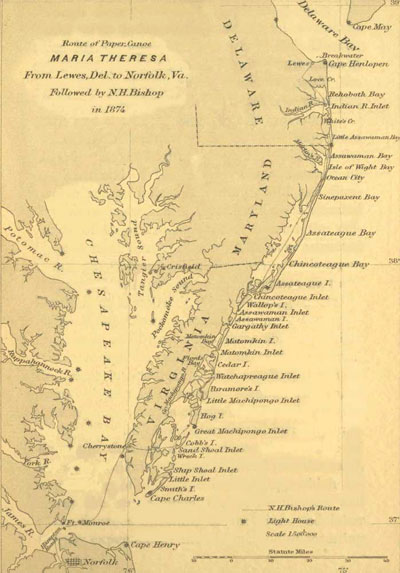 |
| Cherrystone Inlet-Opposite Fort Monroe (Gutenberg.Org) |
Major General GEORGE B. McCLELLAN,
Commanding, &c.:
GENERAL: I have just received yours of the 17th by General Burnside.
You can scarcely imagine the pressure on me for the last two weeks and the anxiety I have had in regard to your movements. When I felt that the safety of Washington depended on the prompt and rapid transfer of your army it is very probable that my messages to you were more urgent and pressing than guarded in their language. I certainly meant nothing harsh, but I did feel that you did not act as promptly as I thought the circumstances required. I deemed every hour a golden one, the loss of which could not be repaired. I deemed every hour a golden one, the loss of which could not be repaired. I think you did not attach so much value to the passing hours; but perhaps I was mistaken. I know that there are several little matters which have annoyed you; they could not be avoided.
You asked a private telegraphic cipher. It could not be given, as all telegraphic messages were required to be shown to the President and Secretary of War. You also asked certain changes of officers, which I could not possibly make. Again, at Cherrystone you thought I left the office without hearing. I supposed I had received two messages from that place and wrote an answer; being completely worn-out I retired, directing any other messages to be kept till I could get some rest. I afterward learned, to my regret, that both of those which had been deciphered were written before you came to Cherrystone. I deeply regretted the mistake, but it was too late to remedy it. I had slept but a few hours for the last three or four nights, and, like the operator who attempted to decipher your messages, I was only half awake at the time.
My dear general, we must not let little things annoy us, but push right ahead to the great end in view.
There is enough and more than enough for all of us to do, although none of us can do exactly what we could wish. That Lee is moving on Pope with his main army I have no doubt. Unless we can unite most of your army with Burnside and Pope, Washington is in great danger. Under these circumstances you must pardon the extreme anxiety [and perhaps a little impatience] which I feel. Every moment seems to me as important as an ordinary hour.
Yours, in haste,
H. W. HALLECK.
Official Records, Series I., Vol. 11, Part 3, Page 380.
Halleck's messages were characterized by clarity, the mark of a good administrator. Here he attempts to placate McClellan over slights imagined or real. Halleck's frank remarks about the current situation in the last paragraph might be considered a classic example of "burying the lead", but they do neatly summarize the state of affairs in the east on this day. Cherrystone is on the opposite shore from Fort Monroe. McClellan had gone to Fort Monroe to try to telegraph Halleck, but the current was out so he crossed over to Cherrystone.
No comments:
Post a Comment